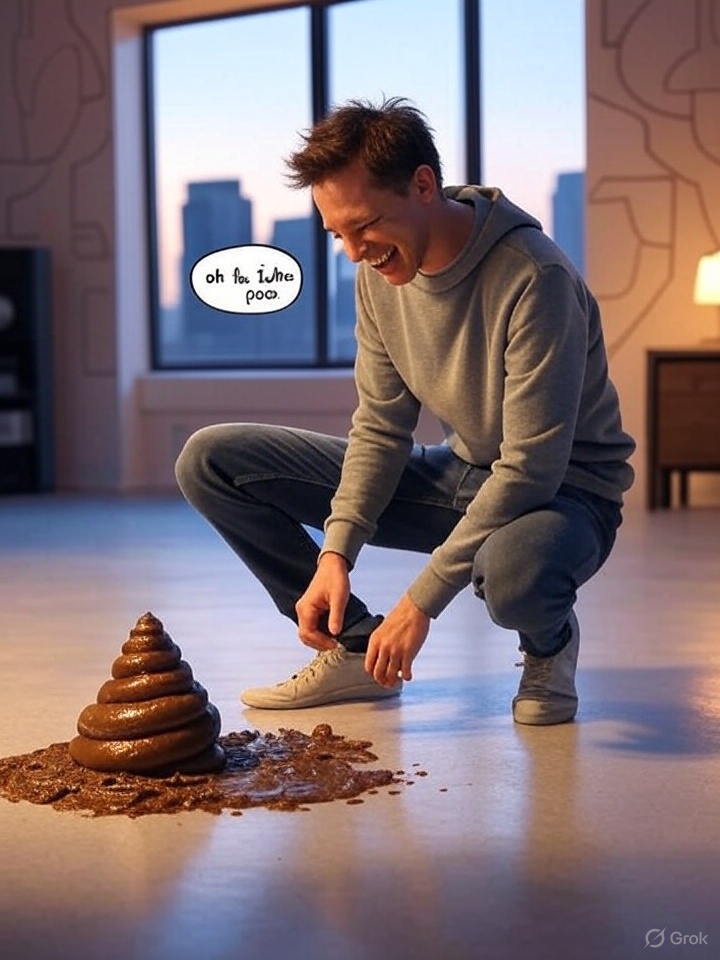When I first became disabled, it weighed on my first wife heavily. She struggled with it more and more until we eventually divorced.
So when I met my second wife, I was apologizing for my limitations. It was so refreshing to hear her respond, "it's okay, I don't care if you're disabled."
Later on, my illness flared up, and my disability temporarily worsened. One night, I was laying on the ground, unable to stand. I asked her for help getting up, and she refused. I asked "why?" She replied, "I already told you years ago when we first met:"
"I don't care if you're disabled."
Joke Poo: The Accountant
When I first became an accountant, it weighed on my first husband heavily. He struggled with the long hours and tax season stress until we eventually divorced.
So when I met my second husband, I was apologizing for the demanding nature of my profession. It was so refreshing to hear him respond, “It’s okay, I don’t care if you’re an accountant.”
Later on, I had to do a particularly complex and ethically questionable audit for a client. I was losing sleep and felt wracked with guilt. I asked him for his honest opinion, desperate for some moral support. He refused to engage. I asked “Why won’t you talk about it?” He replied, “I already told you years ago when we first met:”
“I don’t care if you’re an accountant.”
Okay, let’s dissect this joke!
Core Elements of the Joke:
- Setup: The setup establishes the speaker’s disability, its impact on a previous relationship, and the initial positive (and seemingly supportive) reaction of the second wife. This creates an expectation of understanding and acceptance.
- Twist/Punchline: The punchline subverts this expectation with a literal interpretation of “I don’t care if you’re disabled.” The wife’s statement, initially appearing empathetic, is revealed to be purely indifferent and devoid of any actual support.
- Humor Type: This is dark humor/irony/situational comedy. The humor derives from the unexpected and callous indifference displayed within a situation where compassion is anticipated.
- Key Concept: The ambiguity of language and the difference between saying something and meaning it.
Enrichment & New Humor Attempts:
Now, let’s build upon this with some related factual/interesting tidbits.
Tidbit 1: The Psychology of “Caring”
- Humans are wired for empathy, but “compassion fatigue” is a real phenomenon, especially for caregivers. Studies show that prolonged exposure to suffering can lead to emotional exhaustion and, ironically, less caring behavior.
Joke Idea 1 (Playing on Compassion Fatigue):
“My doctor told me I have a rare condition called ‘Empathy Exhaustion.’ Apparently, I’ve cared too much throughout my life. Now, I just shrug when people tell me their problems. My wife’s disability? Honestly, I’m just too tired to care. It’s not personal…it’s medical.”
Tidbit 2: The Nuances of “Care” in Language
- The word “care” has a fascinating etymology, stemming from Old English “caru,” meaning sorrow or grief. So, in a weird way, “I don’t care” could be seen as an attempt to avoid sorrow or grief.
Joke Idea 2 (Highlighting the language):
My husband said, “I don’t care if you’re disabled.” I said, “That’s the least romantic thing I’ve ever heard!” He replied, “Well, ‘care’ used to mean ‘sorrow,’ so I’m just trying to be optimistic. I prefer to think of you as a source of hilarious mishaps.”
Tidbit 3: The Economics of Caregiving:
- The value of unpaid caregiving in the US is estimated to be in the hundreds of billions of dollars per year. It’s a massive, often invisible, economic contribution.
Joke Idea 3 (Adding an economic twist):
My therapist suggested my wife attend support meetings for carers of the disabled, which she flatly rejected. She stated that she “doesn’t care if I’m disabled.” And when I probed her on the rationale behind this rejection she said “why would I help the disabled for free when I could get paid for it? That’s money left on the table!”
Witty Observation:
“I don’t care if you’re disabled” is the relationship equivalent of installing a fancy security system and then leaving the front door unlocked.
These are just a few examples, of course. The original joke’s strength lies in its stark contrast, so any attempt to enrich it should either amplify that contrast or introduce a surprising new layer.


